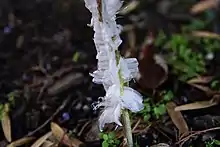Verbesina virginica
Verbesina virginica, known by the common names white crownbeard,[1] or frostweed[2] is a species of flowering plant in the family Asteraceae. It is native to the Southeastern United States, where it is found in calcareous soil, often in bottomland thickets and edges of woods.[3]
| Verbesina virginica | |
|---|---|
 | |
| Scientific classification | |
| Kingdom: | Plantae |
| Clade: | Tracheophytes |
| Clade: | Angiosperms |
| Clade: | Eudicots |
| Clade: | Asterids |
| Order: | Asterales |
| Family: | Asteraceae |
| Genus: | Verbesina |
| Species: | V. virginica |
| Binomial name | |
| Verbesina virginica | |
It is a tall biennial species. It produces heads of white flowers in late summer through fall. The name "frostweed" refers to its tendency to produce frost flowers in freezing weather.
Description
V. virginica grows to 2.1 metres (6.9 ft) tall with winged stalks and alternate, oval or lanceolate leaves. The leaves are up to 18 centimetres (7.1 in) long and 5.1 centimetres (2 in) wide and slightly toothed. Flower heads consist of multiple flowers arranged in a cluster, or corymb, at the terminal end of the stems.[4] Each flower head actually consists of 1 to 5 ray florets and 8 to 15 disk florets.[5]

References
- USDA, NRCS (n.d.). "Verbesina virginica". The PLANTS Database (plants.usda.gov). Greensboro, North Carolina: National Plant Data Team. Retrieved 29 July 2015.
- "Lady Bird Johnson Wildflower Center - The University of Texas at Austin". www.wildflower.org.
- Verbesina virginica in Flora of North America
- "Know Your Natives – Frostweeds "Bloom" Frost Flowers". Arkansas Native Plant Society. 26 November 2013.
- "US Wildflower - White Crownbeard, Frostweed, Iceplant, Virginia crownbeard - Verbesina virginica". USWildflowers.com.